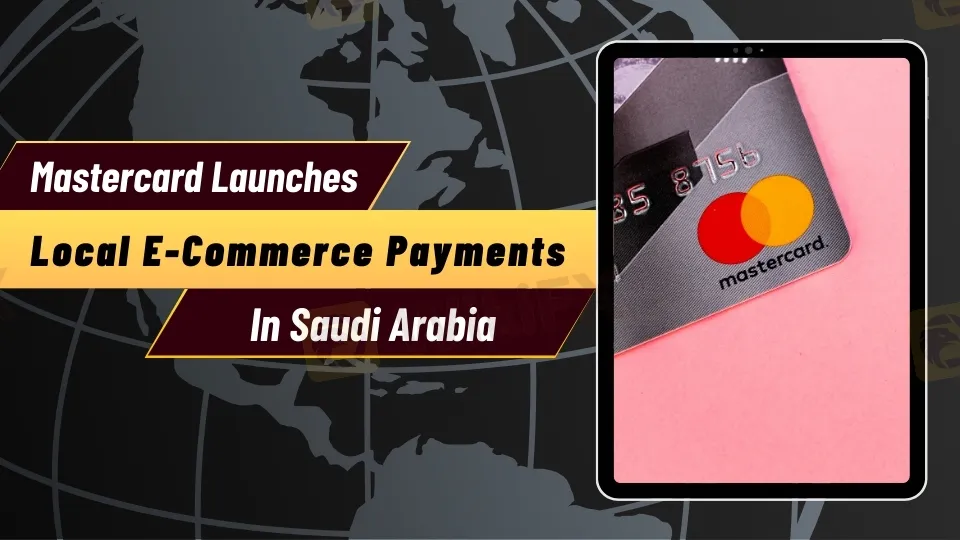简体中文
繁體中文
English
Pусский
日本語
ภาษาไทย
Tiếng Việt
Bahasa Indonesia
Español
हिन्दी
Filippiiniläinen
Français
Deutsch
Português
Türkçe
한국어
العربية
Mastercard Launches Local E-Commerce Payments in Saudi Arabia
Abstract:Mastercard launches local e-commerce payment infrastructure in Saudi Arabia, accelerating the Kingdom’s digital transformation and secure payment solutions.

Mastercard has showcased its cutting-edge technical infrastructure for processing e-commerce transactions locally, a crucial step toward supporting Saudi Arabia's digital revolution. This effort aims to improve the smooth, secure payment experience for Mastercard partners and customers in the Kingdom, therefore supporting the fast expansion of digital commerce in accordance with Saudi Vision 2030.
Mastercard Gateway, backed by the Saudi Central Bank (SAMA), will grow its local presence by providing payment and digital acceptance solutions, ensuring that businesses and customers have access to the most secure and efficient payment systems available. The platform supports over 30 different payment methods and has comprehensive fraud detection and prevention, providing additional security against cyber risks.
Empowering the Digital Economy in Saudi Arabia
This launch represents a watershed moment in Saudi Arabia's efforts to modernize its financial ecosystem, fitting with the country's overarching aims of economic diversification and advancement. Mastercard's investment in local infrastructure will have a substantial influence on the development of the e-commerce, cybersecurity, and fintech industries by connecting merchants to a global network of over 200 acquirers and 110 million acceptance points.

Mastercard's local e-commerce processing capabilities not only assist merchants optimize payment processes but also enable Saudi enterprises to thrive by implementing secure, creative solutions. These activities are consistent with the Kingdom's objective of strengthening its digital payment infrastructure while guaranteeing financial inclusion for all segments of society.
Boosting Innovation in Saudi Arabia's Payment System
Mastercard's support of the Saudi Vision 2030 extends beyond digital infrastructure. Mastercard intends to promote the Kingdom's shift to a cashless economy by investing in local and regional relationships and implementing bespoke fintech solutions. With over 950 million payments completed domestically in 2023, the Mastercard Gateway is projected to play an important part in Saudi Arabia's digital payment future.
Saudi Arabia will stay at the forefront of global digital payment trends as long as its financial infrastructure is strengthened. As Saudi fintech experts, e-commerce enterprises, and payment service providers embrace these developments, Mastercard will continue to propel the Kingdom's digital payment ecosystem ahead.
About Mastercard (NYSE: MA)
Mastercard is a payment technology firm with a worldwide presence. Our purpose is to connect and fuel an inclusive digital economy that benefits everyone, everywhere by making transactions secure, simple, smart, and easy to use. Our ideas and solutions enable people, financial institutions, governments, and organizations to achieve their full potential by using secure data and networks, collaborations, and enthusiasm. Our decency quotient, or DQ, underpins our culture and all we do both within and outside of our organization. With links in over 210 countries and territories, we are creating a sustainable world that offers limitless opportunities to everyone.

Disclaimer:
The views in this article only represent the author's personal views, and do not constitute investment advice on this platform. This platform does not guarantee the accuracy, completeness and timeliness of the information in the article, and will not be liable for any loss caused by the use of or reliance on the information in the article.
Read more

Cinkciarz.pl Under Fire: Frozen Accounts, Missing Funds
Cinkciarz.pl, one of Central Europe’s largest currency exchange platforms, has made headlines after accusing major Polish banks of conspiring to undermine its operations. The company has threatened legal action amounting to 6.76 billion zlotys ($1.6 billion) in damages. However, the platform is now under intense scrutiny following allegations of fraud and the mismanagement of customer funds.

BSP and JICA Renew Partnership to Expand Credit Risk Database for SMEs in the Philippines
On December 11, 2024, a significant milestone was reached in the Philippines' financial sector as the Bangko Sentral ng Pilipinas (BSP) and the Japan International Cooperation Agency (JICA) officially signed the ‘Records of Discussion’ for the second phase of the Credit Risk Database (CRD) project. The ceremony at the BSP headquarters in Manila marked a pivotal moment in widening access to financing for small and medium enterprises (SMEs) across the country.

BSP Pushes for a Cashless Philippines by 2025
The BSP accelerates cashless transactions, aims for a coin-lite society, eliminates small fund transfer fees, and drives financial inclusion by 2025.

Market: The Dominant Force in Oil Prices
Recent fluctuations in oil prices have raised concerns, especially with the sharp rise in gasoline prices.
WikiFX Broker
Latest News
How Long Can the Dollar Remain Strong?
Forex Price Trend Prediction! | Come be a New Year Price Winner!
HFM NY Special Offer!
How a Promised RM1.4 Million Return Turned into a Costly Scam
Cinkciarz.pl Under Fire: Frozen Accounts, Missing Funds
First Unfair Trading Case Reported Under South Korea’s Virtual Asset User Protection Act
“Predict and Win” Big Rewards! Join the Contest Now
South Korean President Yoon Suk Yeol's Arrest Shakes Markets
Titanium Capital LLC Ponzi Scheme: Henry Abdo Admits Fraud, Impacting Over 200 Investors
South Korea's Crypto Regulation Updates for 2025
Currency Calculator






